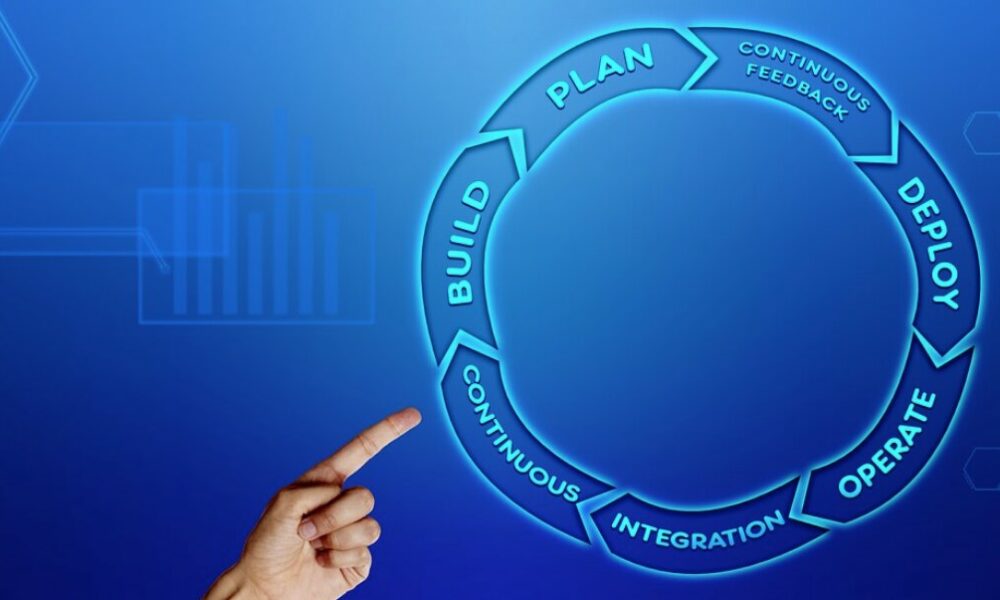
Within the world of software development, one of the positions with the greatest demand is that of devops engineer. Also one of those that allows you to get higher salaries. Of course, having the necessary training to be able to carry out this position, or with the practical experience that leads to becoming a DevOps engineer is not always easy. Or it is not so clear. Additionally, it may be necessary to obtain some certifications to be prepared. If you want to become one, but don’t know where to start or if you’ve already traveled part of the way to achieve it, here we show you everything you need to consider.
What is a DevOps engineer and what responsibilities does he have?
Before knowing what it takes to be a DevOps engineer, of course, it is necessary to clarify what this position entails. DevOps is a software engineering methodology, whose name comes from combining the first three letters of development in English, development (dev), with the English abbreviation of operations: ops. Therefore, a DevOps engineer is the one who performs tasks that combine development work with that of operations teams.
These professionals create an environment of collaboration and shared responsibility with other members of the team, which, when used well, can facilitate the development of safer and higher-quality software, and also do so in less time than with other systems.
A DevOps engineer, therefore, is a position with team management roles, but also dedicated to development. His tasks include maintaining an environment that promotes high-quality software development, as well as performing tasks that cover various areas not just related to development. They also have to tackle tasks more typical of help desk teams. In addition, they are in charge of receiving feedback from developers and, with it, establishing the status of the software under development.
Finding solutions to bugs and problems of all kinds related to the software, so that the project roadmap does not suffer delays is also their job. The same is true for creating scripts for testing, deploying, and debugging the software. In their work they also have to use Agile principles to quickly adapt to changes that may occur in a project.
Among the professionals that a DevOps engineer usually has to work with are system engineers and developers. In addition, they have to ensure that networks, systems and development teams are working properly. And collect the needs of software developers when they are going to start a project based on their requirements. On the other hand, it also has to contribute to the identification of these requirements. As if that were not enough, they also have to keep their team members motivated in order to meet the objectives set for each project.
What do companies ask of these types of professionals?
Becoming a DevOps engineer involves overcome a fairly complete and varied training. It can be divided into several steps, of which the first is have some type of regulated training in development and computer science. Preferably at a higher level, although they can also be students of higher professional training in IT branches that complement their studies with several official certifications and practice Developing.
Of course, the training of a DevOps engineer is not homogeneous. Therefore, to know what it is necessary to learn, first of all it is necessary to know what companies are looking for in a professional of this type. To do this, you can take a look at the DevOps engineer job offers. In them are the requirements that they expect to find in the applicants for the position. In addition, you will be able to get an idea of the experience in development and/or management that they ask for. They may vary between companies, but the base will always be similar.
In addition to an educational foundation, you also need other technical knowledge. Among them, about scripting. To achieve this, it is necessary to know certain programming languages. Like JavaScript, Ruby or Python. It is also necessary to learn to work in Linux environments and use process automation frameworks. These professionals also have to employ DevOps and systems configuration management tools.
For DevOps engineer positions, having experience in various areas is valued. For example, a software developer who has created development process management tools. Or work on operations tasks within a development team.
As for certifications, to IT training you can add specific certifications for DevOps. For example, Kubernetes administration, Linux systems issued by the Linux Foundation, AWS Certified Professional DevOps Engineer, or Microsoft Certified Azure Administrator.
But since it is a position with certain levels of team management, it is essential to have the so-called soft skills. Among them, leadership, time management and those dedicated to facilitating and streamlining collaboration. A good idea to achieve them is, in the current job or training position, to volunteer to carry out tasks related to team leadership. They can also be achieved by creating practice material for developers and systems engineers
Choosing the right career path
In addition to training, a future DevOps engineer has to choose very carefully what jobs, or practical tasks, he occupies and performs. All with the aim of getting the best resume in terms of work experience possible.
Start by select positions that are related to teamworkand that require the use and/or learning of agile methodologies. Later, with experience in development, it is time to lead development teams. Don’t just limit yourself to managing development.
You also have to try to manage entire projects, or at least certain areas of development that your team deals with. However, this is not easy, so try to learn from the work of the manager of all the teams you work in and, if you ask for help from a team member, volunteer to do so. It is perhaps one of the best ways to learn how to manage teams in practice.
Already with the necessary training and experience, it is time to adapt the curriculum to apply for DevOps Engineer positions. It is a type of position with a lot of competition in the processes, which is rewarded with a very high salary. Obviously, this varies depending on the country, the location in them, and even the company and sector. But exceeding 100,000 euros per year is not as complicated as in other positions.
If you have not held any position directly related to DevOps engineering, it is essential that you write your resume so that in each position you have held, you highlight the work carried out in it that is directly related to the work that these professionals usually do.
Do not forget to highlight your soft skills in it, and include all the certifications you have obtained related to the position. If you know the DevOps methodology, or have worked in development teams in which it is applied, it is necessary to mention it as well. This will give you a better chance of landing a top spot as a DevOps engineer.



